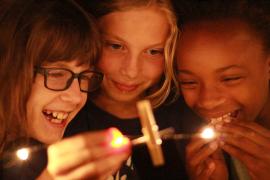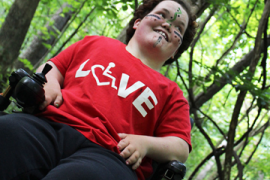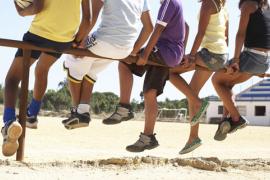“A society grows great when elders plant trees in whose shade they shall never sit.” — Greek Proverb.
Growing up, my family always said it takes a village to raise a child, and it most definitely did for me. My village showed up as mentors with varying backgrounds, identities, and lived experiences. Because of the many mentors I had throughout my journey, I am now Timothy A. Raines, PhD (aka Dr. Tim) — a first-generation Black scholar who grew up in Fort Wayne, Indiana, the youngest of nine children. I am the first in my family to earn a bachelor, two masters, and a PhD in microbiology. It is because of the many mentors who guided and shaped my life by fostering an inclusive environment that celebrated me authentically and pushed me to grow beyond the limits of what I set for myself.
Mentoring is about planting the seeds of confidence, understanding, and growth that will support the mentee long after their camp has ended. Being an inclusive mentor means honoring each camper’s perspectives, experiences, culture, and identities. Think about the most influential mentor you’ve had during your life’s journey. What qualities made this individual so impactful? How did this individual foster a meaningful and lasting relationship with you? Hold tight to those qualities and add them to your mentoring toolbelt.
The Power of Inclusive Mentoring
According to Cornell University faculty, “Inclusive mentorship is a co-constructed and reciprocal relationship between a mentor and mentee who take a strengths-based and identity-informed approach to working together to support their mutual growth, development, and success” (Cornell University, n.d.).
Inclusive mentoring involves intentionally creating a supportive environment that respects and values all identities, acknowledges differences, and actively works to eliminate biases. This type of mentoring is essential in camps, where diverse groups of young people come together, bringing their unique backgrounds and experiences. Inclusive mentoring removes the inherent power dynamic between the mentor and mentee, allowing for a mutual exchange of knowledge, experience, and wisdom. It is about creating a mentoring relationship based on respect and shared learning, rather than one person being the giver and the other the receiver. The influence of a good, inclusive mentor can last a lifetime, providing youth with a positive self-image and self-worth to navigate the world confidently. Furthermore, the power of inclusive mentoring extends beyond the immediate benefits to the mentee. It cultivates a culture of empathy and understanding, fostering an environment where everyone feels valued and included — a true sense of belonging. This ripple effect can transform entire camp communities, as campers who have experienced inclusive mentoring often become mentors themselves and aspire to return as camp staff, continuing the cycle of support and inclusion.
Key Principles of Inclusive Mentoring
Mentors generally serve as guides, supporters, and role models. They play a pivotal role in helping campers navigate new experiences, develop skills, and build self-assurance. Inclusive mentors go a step further by:
- Respecting all identities. Recognize and honor the diverse identities of campers, including race, ethnicity, gender, sexual orientation, disability, and socioeconomic status. Check out this insightful article by Zeina Dagher on Medium, “The Power of Accepting Each Other’s Differences." This piece explores the importance of embracing diversity and understanding the unique perspectives that everyone brings.
- Acknowledging differences. Each camper brings unique experiences and perspectives, which should be recognized, celebrated, and incorporated. Read the article “Confronting Barriers to Belonging at Camp” by Christen Peterson, CYC-P, from the September/October 2023 Camping Magazine issue. This article offers practical strategies to foster a sense of belonging among all campers, ensuring everyone feels valued and included.
- Accessing unexamined biases: Reflect on personal biases and assumptions to create a more inclusive environment. Project ABC, an Early Childhood System of Care Community, has developed this video, Our Hidden Biases, to ignite meaningful discussions among child-serving professionals.
- Developing cultural competency. Continuously learn and adapt to better understand and support campers from various cultural backgrounds. This engaging What Is Cultural Competence? video features university students sharing their perspectives on cultural competency and its personal significance. It provides valuable insights into how cultural awareness and understanding can impact both personal and professional interactions (Arkansas Open Educational Resources, 2021).
- Focusing on positive coping strategies. Teach campers’ healthy ways to cope with challenges and stress, emphasizing resilience and positive mental health. Explore the article “Reframing Mental Health at Camp” by Dave Brown, LCSW, from the January/February 2023 Camping Magazine issue. This insightful piece provides practical strategies for camp leaders to support the mental well-being of both campers and staff.
Strategies for Inclusive Mentoring in Camps
As camp professionals, developing an inclusive mentoring practice that reflects your core values and how best to support your mentees is crucial. Here are actionable steps to get you started:
- Brainstorm elements of your philosophy. Identify the key principles of your mentoring approach. Set aside dedicated time for reflection. Use prompts like “What experiences have shaped my views on inclusion?” or “What values do I hold most dear in mentoring?”
- Guiding Prompts: Consider these questions:
- What are your core values as an inclusive and equitable mentor?
- How do you define success in a mentoring relationship?
- What are your nonnegotiables in terms of creating a supportive environment?
- Guiding Prompts: Consider these questions:
- Define your role clearly. When practicing inclusive mentoring, assess your level of comfort and ability to mentor your mentee. Consider the following:
- Transparency. Clearly communicate with your mentees about what you can and cannot provide. This sets realistic expectations and helps build trust.
- Setting boundaries. Establish and discuss boundaries early on. For example, clarify your availability, the scope of your support, and any limitations.
- Access unexamined biases. Regularly engage in self-reflection exercises to identify and address your biases. Ask yourself, “What biases do I bring into this mentoring relationship?” and “How can I mitigate the impact of these biases?”
- Implicit bias tool. Project Implicit offers the Implicit Association Test (IAT), which measures unconscious biases. It helps individuals recognize and understand their implicit attitudes and stereotypes. You can explore and take these tests on the Project Implicit website: implicit.harvard.edu/implicit/takeatest.html
- Feedback loop. Create a feedback loop where mentees can safely share their experiences and perceptions. Use this feedback to identify and address any unconscious biases.
- Practice cultural humility. Be open to learning from your campers’ diverse experiences and knowledge, and adjust your mentoring practices to support their cultural contexts better.
- Recognizing limitations. Acknowledge the limits of your cultural knowledge and show a willingness to learn from your mentees. Ask open-ended questions about their cultural background and experiences.
- Centering experiences. Focus on understanding and valuing your mentee’s perspective. Make their experiences central to your mentoring approach and validate their feelings and viewpoints.
It is worth noting that you are not expected to be everything to everyone. This means you may not be able to mentor every camper you encounter effectively, which is OK. I believe in the idea of a mentoring network instead of a dyad mentoring — single mentor-mentee pairing (National Academies of Sciences, Engineering, and Medicine, 2019). “Networking is the key to life,” and setting every youth up with a team of mentors and resources will set them up for success.
A Training Anecdote
Once, during an inclusive mentoring training session I was facilitating, I had an older white gentleman ask how he could not show up as an “old white dude.” I responded that we inherently look at someone’s outward appearance first; however, the camper will learn if you are authentic and trustworthy. Once that has been established, they will not care that you are an “old white dude” and will be willing to connect and learn from you. So, the goal is to be who you are and stay authentically true to yourself in the mentor-mentee relationship. One of my best mentors was an “old white dude” who I trusted to help me navigate through my PhD, and to this day, I value him with my whole heart!
Dr. Tim’s Practical Tips for Mentors
Here are a few strategies I have utilized to connect with youth from various backgrounds:
- Cultivate a brave space. Most people are familiar with the term “safe space”; however, I don’t believe every space can be safe. So, in your mentoring relationships, work to establish a brave space where you hope the youth you serve are empowered and courageous to share their authentic selves and identities with you, even when they are a bit scared. Do this by showing your humanity and being true to yourself.
- Keep it 100. Always be authentically yourself with the youth. Do this by staying true to who you are and allowing the youth to engage with you in ways that are authentically true to them, whether it is through language, mannerisms, or self-expression.
- Trustworthiness. If people don’t trust you, they won’t follow you or learn from you. Trust is hard to build and difficult to give, but once you have it, your mentor-mentee relationship will grow exponentially. In my experience, a great mentor is someone who I can trust completely, to the extent that I am willing to share even my social security number without fear or concern.
- Intent vs. impact. Be conscious of the words you use and how they may land and affect someone. If they land negatively, focus on the impact first and apologize for the harm. This is so important with the youth we serve because if they trust you, they will recognize that your intent was not to harm or hurt, although the impact of your words in the moment may have done both. If they trust you, they are more willing to forgive you and to work to understand your intent.
- “Vulnerability paradox.” Brené Brown tweeted about a “vulnerability paradox,” stating, “Vulnerability is the first thing I look for in you and the last thing I want you to see in me” (2019). We, the mentor and mentee, are looking for shared humanity and connection in each other. It is important as a mentor to be vulnerable and share your professional journey and some of your personal stories.
- Say what you mean, and mean what you say: You must keep your word as much as possible. Once a youth learns you have broken a promise, they will quickly lose faith in you, and it can take a long time to rebuild that trust.
Final Thoughts
Mentoring offers a unique opportunity to positively influence young people. By adopting inclusive mentoring practices, camp professionals can create an environment where all campers feel respected, valued, and supported. This inclusive approach benefits the campers and enriches the entire camp community.
As mentors, we are privileged and responsible for planting the seeds of inclusion and nurturing the growth of confident, compassionate, and empowered individuals. By respecting all identities, acknowledging differences, accessing unexamined biases, and developing cultural competency, we can create a camp environment embodying the spirit of inclusion.
Remember, at the end of the day, “We’re all just walking each other home.”
– Ram Dass.
Photo courtesy of Black River Farm and Ranch, Croswell, MI.
Timothy A. Raines, PhD, (he/him) is a diversity, equity, inclusion, and belonging consultant specializing in cultural competency and inclusive leadership principles. His journey as a scientist, cultural navigator, equity educator, and inclusion advocate has left an indelible mark in academia and beyond. With certifications as an Intercultural Development Inventory Qualified Administrator, a Leadership Practices Inventory Coach, and a Certified Diversity Executive (CDE), Dr. Tim brings a wealth of knowledge and experience to the field. Passionate about fostering inclusive environments, he has dedicated his career to mentoring and coaching individuals and organizations to create spaces where everyone can thrive.
References
Arkansas Open Educational Resources. (2021, August 27). Video 1: What is Cultural Competence? -->. YouTube. youtube.com/watch?v=tsWbODQiDWs
Brown, B. [@BreneBrown]. (2013, July 9). The vulnerability paradox: It’s the first thing I look for in you and the last thing I want you to see in me [Post]. X. x.com/BreneBrown/status/354577580243951620
Brown, D. (2023, January 1). Reframing Mental Health at Camp. Camping Magazine. ACAcamps.org/article/camping-magazine/reframing-mental-health-camp
Cornell University. (n.d.). Faculty Advancing Inclusive Mentoring. faculty-inclusive-mentoring.cornell.edu/
Dagher, Z. (2021, February 21). The power of accepting each other’s differences. Medium. zeinahdagher.medium.com/the-power-of-accepting-each-others-differences-f38a2ab242b9
Implicit Project. (n.d.). Take a test. Harvard University. implicit.harvard.edu/implicit/takeatest.html
National Academies of Sciences, Engineering, and Medicine; Policy and Global Affairs; Board on Higher Education and Workforce; Committee on Effective Mentoring in STEMM, Dahlberg, M. L., & Byars-Winston, A. (Eds.). (2019). The Science of Effective Mentorship in STEMM. National Academies Press (US).
Peterson, C. (2023, September 1). Confronting barriers to belonging at camp. Camping Magazine. ACAcamps.org/article/camping-magazine/confronting-barriers-belonging-camp
Pfund, C., Branchaw, J. and Handelsman, J. (2014). Entering mentoring. New York, NY: WH Freeman & Company.
Picture Alternatives. (2019, November 12). Our Hidden Biases -->. YouTube. youtube.com/watch?v=ZWgVs4qj1ho




